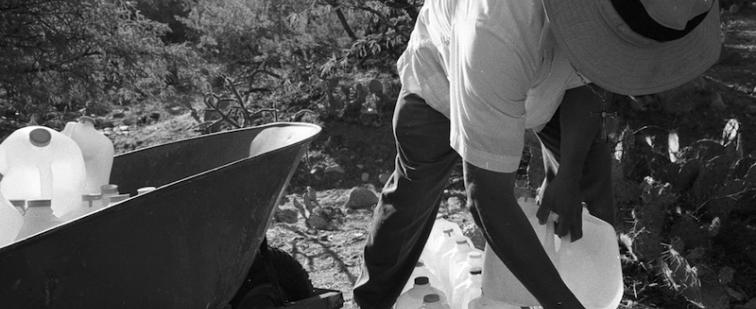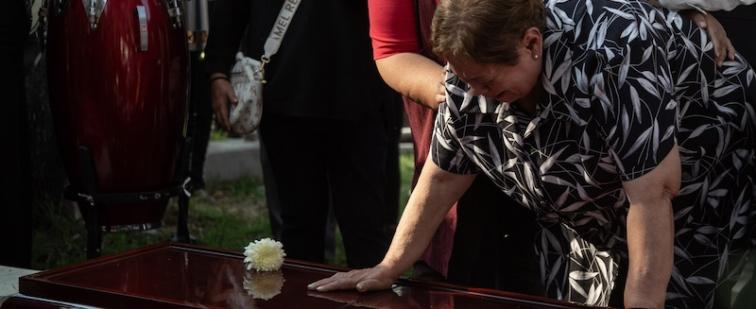Home
While the mainstream media fumes over the possibility of indefinite re-election in Venezuela, local reaction of some chavista sectors provides compelling insights into the course of Venezuela's revolutionary process. Some chavistas support the referendum in undying devotion to Chávez, for many others its pure pragmatism. For still others, the officials in the government are just incubators of a more radical project.
 |
The new in-depth report, "The 2009 El Salvador Elections: Between Crisis and Change," by CISPES, NACLA, and Upside Down World reflects on El Salvador's current situation as well as the possibilities and challenges ahead at this pivotal moment for the nation's future. The leftist FMLN party currently holds a double-digit lead in the presidential election to be held on March 15. An FMLN victory would end 20 years of one-party rule by the main right-wing party. El Salvador could soon be joining the broadening coalition of left-leaning governments in Latin America.
On January 25, Bolivians will vote on whether to approve a new constitution, which polls indicate will be easily passed. The new constitution will introduce sweeping changes, particularly on indigenous rights and on the fundamental right of every citizen to have access to basic public services. It also calls for a more active role for the state in economic matters and natural resource control. The constitution makes important reforms in the areas of gender, environment, labor, and land tenure. But it remains unclear how many of these changes will be implemented.
The governments and corporations that hold power all over the globe are pushing people from their homes with one hand and punishing them for leaving with the other. Any policy addressing the right to migrate needs to take into account “the right not to migrate” — already a popular slogan among indigenous people from the southern Mexican state of Oaxaca, as documented by labor journalist David Bacon.
Our friends at the Committee in Solidarity with the People of El Salvador (CISPES) have launched a blog providing reports and analysis on the upcoming local and presidential elections. On January 18, Salvadorans will vote for municipal and legislative representatives, followed by the presidential election on March 15. If current polls hold, the leftist FMLN will win the presidency.
Revelations made by a determined community media reporter in Venezuela indicate that four leading figures of the opposition against President Hugo Chávez may have met with a U.S. official in Puerto Rico. The details of the meeting remain sketchy, but the brewing scandal is already stoking the flames of what promises to be one of the most heated electoral battles in Venezuelan history: the constitutional referendum on whether to allow elected officials, including Chávez, to seek multiple reelection.
This is the third installment of an ongoing debate between Human Rights Watch (HRW) and a group of academics over the organization's recent report, "A Decade Under Chávez: Political Intolerance and Lost Opportunities for Advancing Human Rights in Venezuela." The academics respond that HRW's defense of its report stonewalls and ignores their original criticisms.
Crossing the Guatemala-Mexico border region is perhaps the most dangerous leg of undocumented Central Americans' long journey to the United States. This border region also demonstrates in microcosm everything that's wrong with U.S. policy toward Mexico and Central America, where free trade, the drug war, US-backed militarization, and repressive immigration policies converge—making a bad situation worse for Central American migrants.
 |
In this second installment of a two-part mini documentary series on border vigilantes, Glenn Spencer is mounting his last stand. The former oil-man moved to this Arizona border property from California six years ago to direct the non-official American Border Patrol in its efforts to mount an internet-based vigilante border security program he calls "Operation Virtual Vigilance." Spencer manages a sophisticated network of surveillance cameras that stream their video signals to the Internet in real-time.
 |
In this first installment of a two-part mini documentary series on border vigilantes, Britt Craig works quietly and alone. Parked overlooking the U.S.-Mexico border near Campo, CA, he spends long nights in his modified Chevrolet truck on the look out for migrants or smugglers. Three years ago, Craig battened up his boat, a 30-foot cruiser that was his home in St Augustine, FL. He was heeding a call to join the nascent Minutemen Project near Douglas, AZ. He has not left the border since.











